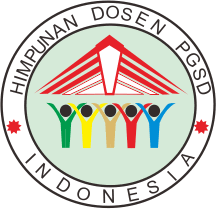Analisis keefektifan pembelajaran daring dalam muatan pelajaran PPKn kelas 5 sekolah dasar
Abstract
The purpose of this study was to determine the effectiveness of online learning on civic education subjects for Class V Elementary School 1 Semali. The subjects of this study were class teachers and students of class V Elementary School 1 Semali, totaling 25 children. There are 3 discussions to determine the effectiveness of online learning, namely the implementation of online learning, the activeness of students when participating in online learning, and student learning outcomes. Data collection techniques in this study included interviews, observation, and document analysis. The data of this study indicate that the implementation of online learning in class V of the State Elementary School 1 Semali is going well, but the students are not active during learning. This results in the teacher's assessment being less than optimal so that student scores tend to decrease during online learning. Based on the data, it can be concluded that the effectiveness of online learning in the subject of Citizenship Education Class V Elementary School 1 Semali for the academic year 2021/2022 is less effective because of the 3 indicators only 1 aspect is in the good category while the other 2 aspects in the poor category and tends to decrease.
Keywords
Full Text:
PDFReferences
Adhe, K. R. (2018). Pengembangan Media Pembelajaran Daring Matakuliah Kajian PAUD di Jurusan PG PAUD Fakultas Ilmu Pendidikan Universitas Negeri Surabaya. Journal of Early Childhood Care and Education, 1(1), 26-31. [2] Afifah, E. P., Wahyudi, W., & Setiawan, Y. (2019). Efektivitas Problem Based Learning Dan Problem Solving Terhadap Kemampuan Berpikir Kritis Siswa Kelas V Dalam Pembelajaran Matematika. MUST: Journal of Mathematics Education, Science and Technology, 4(1), 95- 107. [3] Isjoni dan Ismail (2008). Model-Model Pembelajaran Mutakhir Perpaduan Indonesia-Malaysia. Yogjakarta: Pustaka Pelajar. [4] Moleong, Lexy J. (2004). Metodologi Penelitian Kualitatif. Bandung: PT. Remaja Rosdakarya. [5] Mulyasa. (2012). Praktik Penelitian Tindakan Kelas. Bandung:Remaja Rosda karya. [6] Nana, Sudjana. (2010). Penilaian Hasil Proses Belajar Mengajar. Bandung: PT Remaja Rosdakarya. [7] Nizam, Aris Junaidi. 2020. Booklet Pembelajaran Daring. Jakarta: Direktorat Jenderal Pendidikan Tinggi Kemdikbud RI. [8] Rigianti, H. A. (2020). Kendala Pembelajaran Daring Guru Sekolah Dasar Di Banjarnegara. Elementary School: Jurnal Pendidikan dan Pembelajaran keSD-an, 7(2). [9] Rohmawati, A. (2015). Efektivitas Pembelajaran. Jurnal Pendidikan Usia Dini, 9(1). [10] Sagala, Syaiful. (2009). Manajemen Strategik dalam Peningkatan Mutu Pendidikan. Bandung: Alfabeta. [11] Samsuri. (2011). Pendidikan Karakter Warga Negara. Yogyakarta: Diandra Pustaka Indonesia [12] Sugiyono. (2017). Metode Penelitian Kuantitatif, Kualitatif, dan R&D. Alfabeta. Bandung. [13] Supardi, (2013). Sekolah Efektif Konsep Dasar dan Praktiknya. PT Raja Grafindo Persada, Jakarta. [14] Syarifudin, A. S. (2020). Impelementasi Pembelajaran Daring untuk Meningkatkan Mutu Pendidikan Sebagai dampak Diterapkannya Social. [15] Yusuf, B. B. (2018). Konsep dan Indikator Pembelajaran Efektif. Jurnal Kajian Pembelajaran dan Keilmuan, 1(2), 16-20.
Refbacks
- There are currently no refbacks.



